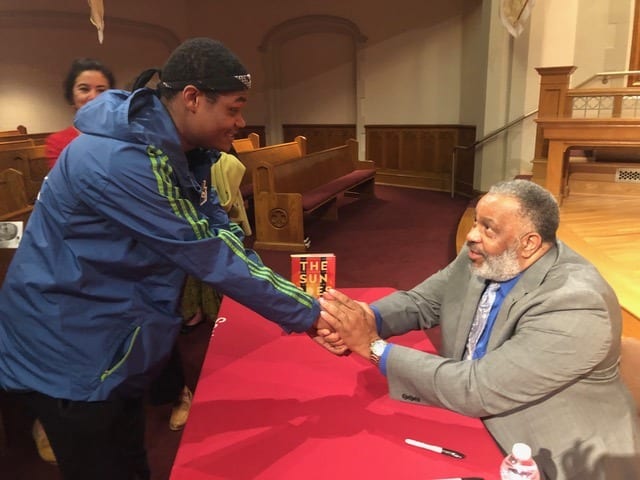
Introductions: Anthony Ray Hinton
May 2, 2019
By Christina Gould, SAL Patron Services Manager
A year ago, almost to the day, I traveled to Montgomery, Alabama for the Equal Justice Initiative’s unveiling of the Legacy Museum: From Enslavement to Mass Incarceration and The National Memorial for Peace and Justice.
It was there on a panel discussion, Reforming Criminal Justice in America, that I first saw Anthony Ray Hinton who was falsely accused and served 30 years on Death Row. Mr. Hinton depicts his long road to freedom in his book, The Sun Does Shine. He is a captivating story teller. As I listened to his story of injustice, I felt rage, shame and an immense sadness. And yet, I found myself smiling and laughing. He is a man with a sense of humor, love in his heart, and a twinkle in his eye.
No need to mince words here. Mr. Hinton’s story is a lynching by men in black robes instead of white. The state of Alabama convicted him based on an old gun of his mother’s that hadn’t been fired in years. At his arrest, he was told by the lieutenant that it didn’t matter if he committed the crimes of first-degree kidnapping, robbery and attempted murder. There were five reasons he would be convicted: because he was black, because a white man was going to say he shot him, and because he would have a white district attorney, a white judge, and a white jury. It was 1985, and Mr. Hinton was 29 years old.
How does one survive Death Row? As we learn in The Sun Does Shine, Anthony Ray Hinton survived by making the choice that spending his days waiting to die was no way to live. Instead, he explored the powers of his creative mind: he married a movie star, divorced her, and married another; he flew to England to meet the Queen, drank high tea and played croquet with her; he had a professional career as a New York Yankee.
His creativity guided him toward natural leadership; Mr. Hinton started the first-ever book club in Holman State Prison; he remained a loving son and was a kind friend to inmates and guards a like; he believed his innocence would set him free and had the fearless Bryan Stevenson, founder of Equal Justice Initiative filing appeal after appeal for 15 years. To quote Mr. Hinton, “The State of Alabama could steal my future and my freedom, but it couldn’t steal my soul or humanity. And it certainly couldn’t steal my sense of humor.”
I don’t think it is an overstatement to compare Anthony Ray Hinton to Nelson Mandela. Archbishop Desmond Tutu has said, “Nelson Mandela spent 27 years in prison for opposing a racist system in South Africa. Anthony Ray Hinton spent 30 years on death row because a racist system still exists in America. Both emerged from their incarceration with a profound capacity to forgive. They are stunning examples of how the most horrendous cruelty can lead to the most transcendent compassion.”
SAL cares about stories. The stories SAL presents matter to me, as I know they matter to all of you. I am so grateful that we have this opportunity to hear from the author of the soul-expanding story depicted in The Sun Does Shine. Please join me in welcoming a powerful advocate against the death penalty, a fierce activist for criminal justice, the humorous, resilient, and compassionate Mr. Anthony Ray Hinton.